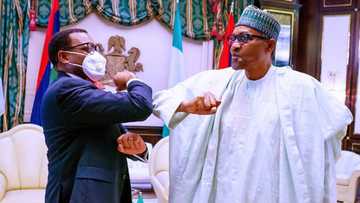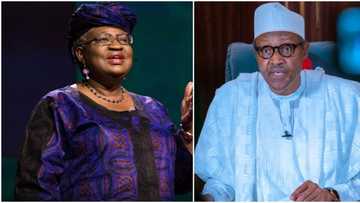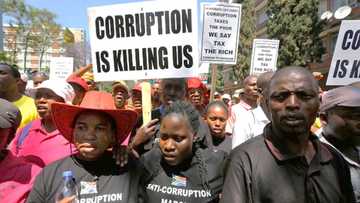OPINION: eNaira and Emefiele’s Many Reforms by Khalifa Mahmood
Editor's note: Katsina-based Khalifa Mahmood, writes on the many reforms currently ongoing under the administration of Chief Godwin Emefiele in the Central Bank of Nigeria, noting that they are improving the lives of ordinary Nigerians.
PAY ATTENTION: Click “See First” under the “Following” tab to see Legit.ng News on your Facebook News Feed!
The recent launch of the Central Bank Digital Currency (eNaira) didn't come to many Nigerians who have been following the unparalleled feats of the Central Bank of Nigeria (CBN) governor, Chief Godwin Emefiele, with keen attention as a surprise.
By this singular feat of Emefiele’s CBN, Nigeria has become the first country in Africa, and one of the first in the world to introduce a digital currency to its citizens. This is no small achievement, particularly as the country, like other parts of the world, is coming out of COVID-19 induced recession.
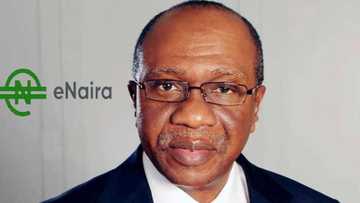
Read also
Central Bank of Nigeria reveals nigerians exchange N46.3 million on enaira platform in less than two weeks
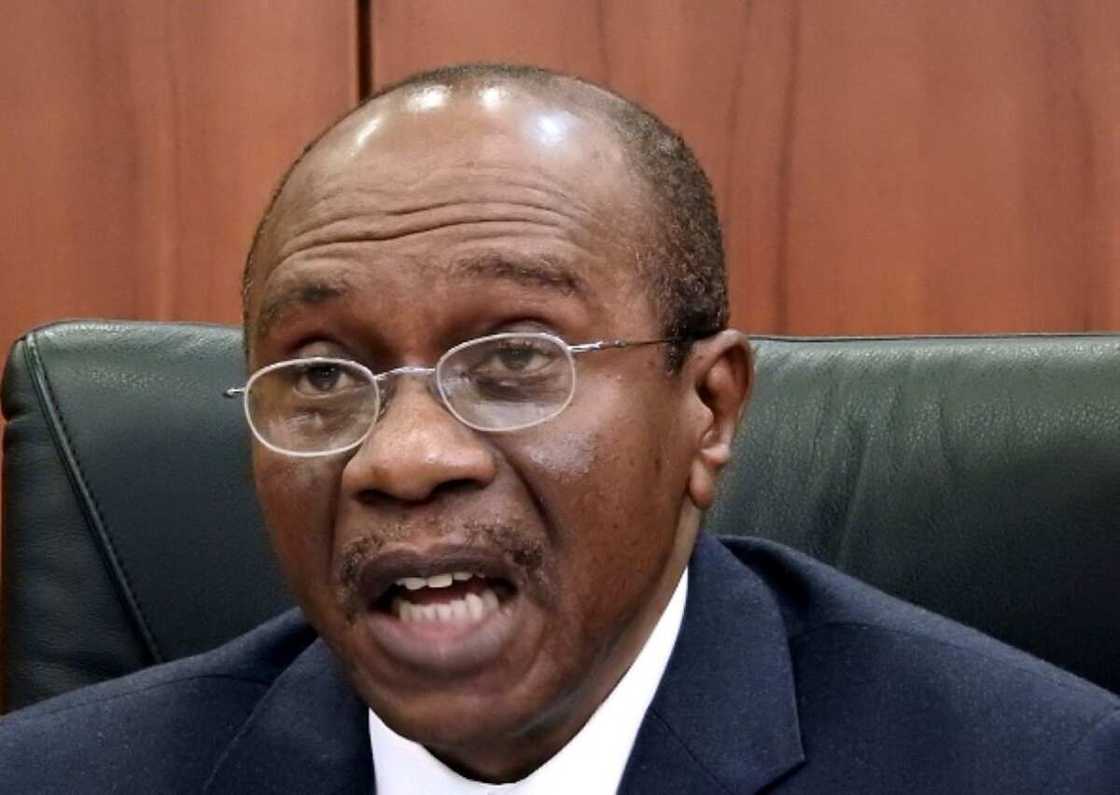
Source: Facebook
This breakthrough, like many others before it in Nigeria's financial ecosystem, is a blockchain technology that will add a whopping $2.9 trillion (N1.189 trillion) every year to the country's Gross Domestic Product (GDP).
What this simply means is that: the country’s GDP will be raised by $29 billion in the next 10 years. This was aptly captured by President Muhammadu Buhari during the launch of the national digital currency midwifed by Emefiele’s CBN.
Do you have a groundbreaking story you would like us to publish? Please reach us through info@corp.legit.ng!
“Alongside digital innovations, CBDCs can foster economic growth through better economic activities. Indeed, some estimates indicate that the adoption of CBDC and its underlying technology, called blockchain, can increase Nigeria’s GDP by US$29billion over the next 10 years,” the president proudly announced.
The eNaira, will among others, help increase remittances, foster cross-border trade, improve financial inclusion, make Monetary Policy more effective, and enable the government to send direct payments to citizens eligible for specific welfare programmes.
At the launching, the CBN governor also unveiled a new financial instrument christened “The 100 for 100 PPP – Policy on Production and Productivity” to reduce the nation's overdependence on imports.”
He said the instrument “will be anchored in our Development Finance Department under my direct supervision.”
“Under this policy, the CBN will advertise, screen, scrutinize, and financially support 100 targeted private sector companies in 100 days, beginning from 01 November 2021, and rolling over every 100 days with a new set of 100 companies, whose names will be published in National Dailies for Nigerians to verify and confirm.
“The purpose of this instrument is to take further steps to reverse our over-reliance on imports,” the CBN governor said.
Chief Emefiele said working through banks, the financial instrument would be available to their customers in critical areas to boost production and productivity, with a view to immediately transforming and jumpstarting the productive base of the economy.
“After these 100 projects by companies in the first 100 days from November 1, we will take the next 100 companies/projects for another 100 days beginning February 1, 2022, and then another 100 companies for another 100 days beginning from May 1, 2022.
“We believe that if we target and support the right companies and projects, we will see a significant, 14 measurable and verifiable increase in local production and productivity, reduction in certain imports, increase in non-oil exports, and improvements in the FX-generating capacity of the economy.
“This, in my view, is the best and most sustainable way to address the Naira’s value –whether in hard currency or digital eNaira – through production, production, and more production,” Chief Emefiele explained.
Financial analysts and economists have, for years, realized the tremendous reforms the CBN governor brought to the country’s financial and economic sectors through various programmes and policies, with eNaira being the latest.
In an attempt to save the naira, for instance, the CBN has issued at least 21 policies and directives between September 2020 and September 2021.
In August 2020, Emefiele resolved to go tough on exporters who were guilty of forex non-repatriation. This was another effort to tackle the prevalent forex crisis in the country by increasing forex liquidity. The CBN ordered banks to submit the names, addresses, and Bank Verification Numbers (BVNs) of all the exporters who had failed to repatriate their export proceeds, for necessary ‘action’.
When faced with rising cases of forex hoarding and funding of militant and terrorist groups, Emefiele swooped to action by taking deliberate and albeit drastic policies in arresting those maladies with catastrophic effects on the security architecture of the country.
After the CBN’s monetary policy rate (MPR) meeting in July 2021, Chief Emefiele braved the odds and banned Bureau De Change (BDC) operators from accessing forex, and also said some of them have become conduits for illegal financial flows working with corrupt people to conduct money laundering in Nigeria.
“They have turned themselves away from their objectives. They are now agents that facilitate graft and corruption in the country. We cannot continue with the bad practices that are happening at the BDC market,” the CBN chief said.
He said the depreciating value of the national currency was partly because of prevailing ownership of several BDCs by the same promoters to procure multiple forex from the central bank.
“Several international organizations, embassies patronise BDC through illegal forex dealers to fund their institutions. We will deal ruthlessly with Nigerian Banks that deal with illegal BDCs and we will report foreign organisations patronising them,” he said.
It is a truism that not all BDC operators are engaged in subterranean operations in their course of doing their businesses. But the fact remains that some enemies of Nigeria are using the unofficial forex windows to perpetrate crimes against the country.
The apex bank, as part of the operation, traced and blocked billions of naira to businesses belonging to persons in banks in a series of ‘post no debit letters.
The CBN governor did not stop there. Despite the political repercussions, the CBN in March 2021, froze 193 corporate and individual bank accounts over allegations of suspicious forex transactions. This was done after 138 accounts were frozen earlier in February.
Not done yet, in April 2021, the CBN investigated and engineered the arrest and arraignment of over 400 persons across the country in an ongoing nationwide crackdown on financiers of Boko Haram and other criminal groups in Nigeria.
All these are Emefiele’s continuous efforts in tackling terrorism and terrorist financing across the country. This alone will hasten the defeat of terrorists as they are starved of funds, hardware, food, weapons, and everything.
While working tirelessly to ensure physical security, the CBN under Emefiele is equally bent on reducing unemployment, particularly among the youths.
Just recently, the CBN developed the Tertiary Institutions Entrepreneurship Scheme (TIES), in partnership with Nigerian polytechnics and universities to harness the potential of graduate entrepreneurs (gradpreneurs) in the country.
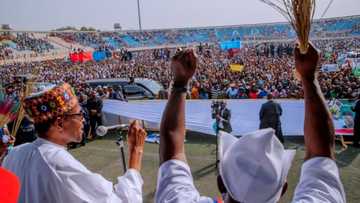
Read also
Fact check: How true is FG’s claim that oil price averaged $100 per barrel for 16 years under PDP?
The goal of the TIES is to enhance access to finance to undergraduates and graduates of polytechnics and universities in Nigeria with innovative entrepreneurial and technological ideas.
Under this policy, the CBN will offer N500 million grant to graduates, undergraduates with the best entrepreneurship pitch across the tertiary institutions.
Emefiele's revolution has touched not only those in the fiscal sectors, but even the peasant farmers at the downtrodden ladder. Despite the coronavirus pandemic that precipitated global lockdown, Nigeria didn’t suffer food shortage. This is thanks to Emefiele's agro-economic intervention.
The CBN governor principally achieved this through the Anchor Borrowers Programme(ABP) launched by President Buhari in 2014.
It is public knowledge that the ABP has empowered rice farmers and processors in the country and resulted in a significant boost in rice production in the country. Official data shows that the ABP has added six million metric tons of rice supply in the country annually and created nearly six million direct jobs in a year.
Official statistics from the Rice Farmers Association of Nigeria (RIFAN) reveal that about two million direct jobs are created every cropping season. And Nigeria has three cropping seasons in a year, all of them fully funded by the CBN. These jobs are restricted to only the production value chain of rice, and not include millions of other jobs created in the processing, packaging, transport, marketing sectors of the rice ecosystem.
Courtesy Emefiele’s reforms, over 100 integrated rice millers are currently working across the country, providing thousands of direct and indirect jobs. This Is not to mention over 50 fertilizer plants, hiring thousands and counting.
The ABP has so far saved Nigeria over N369 billion per annum, while the country consumes N1.5 billion worth of rice every day. This breakthrough has saved the country the challenge of sourcing forex or devaluing our currency to finance this monstrous import wage bill.
There is no gainsaying repeating the fact that Emefiele is playing a crucially unprecedented role that is shaping almost all the spheres of our human lives, irrespective of our economic status and whether we live in cities or in villages.
Disclaimer: The views and opinions expressed here are those of the author and do not necessarily reflect the official policy or position of Legit.ng.
Your own opinion articles are welcome at info@corp.legit.ng— drop an email telling us what you want to write about and why. More details in Legit.ng’s step-by-step guide for guest contributors.
Contact us if you have any feedback, suggestions, complaints, or compliments.
Source: Legit.ng



